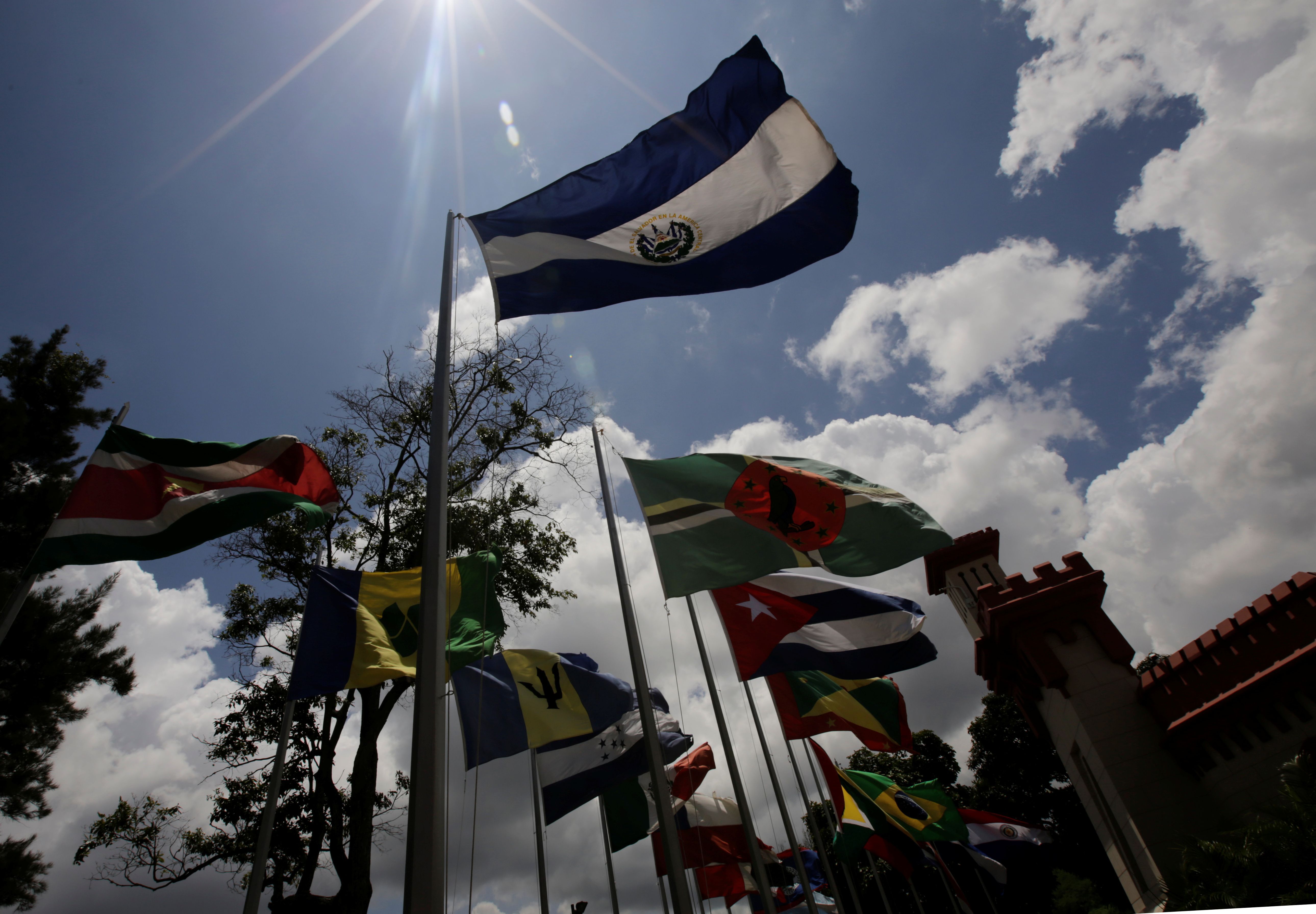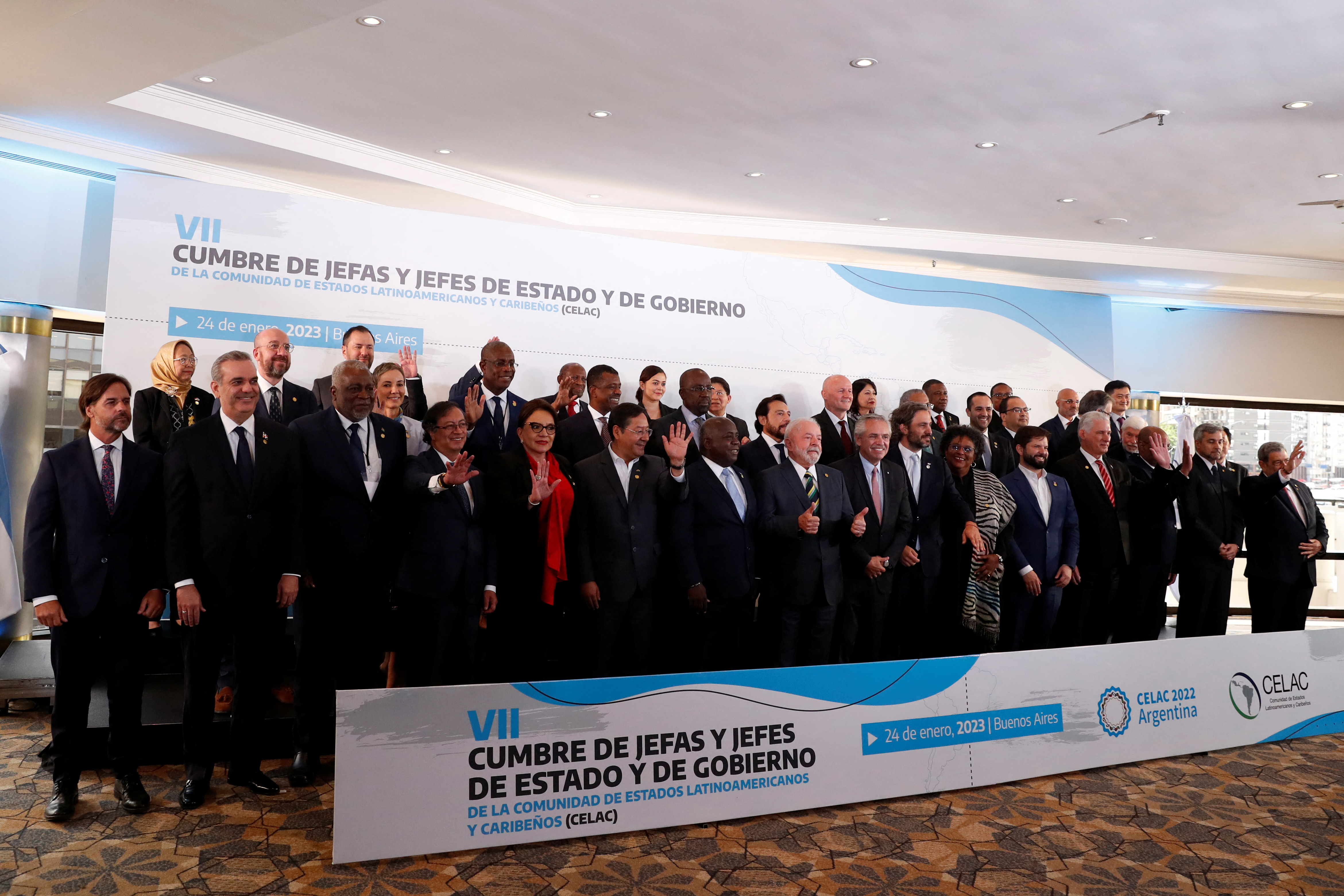Spain Strives to Boost the EU's Relations with Latin America and the Caribbean
The Spanish government cites the deepening of the European Union’s partnership with Latin America and the Caribbean (LAC) among the main objectives of its presidency of the Council of the EU, which begins on 1 July this year. The first summit of heads of state and government of both regions since 2015, scheduled for 17-18 July in Brussels, is the main point on that agenda. The deficit of mutual interest between EU and LAC states and differences over trade liberalisation and Russian aggression against Ukraine are just some of the challenges in strengthening the bi-regional partnership. The recent decision of the Spanish authorities to call snap parliamentary elections on 23 July will complicate the presidency’s plans.
.jpg) YVES HERMAN / Reuters / Forum
YVES HERMAN / Reuters / Forum
Context
Strengthening Spain’s position as a key LAC partner in the EU and promoter of closer bi-regional relations has been a constant in the country’s foreign policy. The Spanish presidency of the Council of the EU in the second half of this year will favour achieving that goal. The government of Prime Minister Pedro Sánchez will be responsible for implementing an important part of the roadmap to reinvigorating the EU’s relations with the Community of Latin American and Caribbean States (CELAC), launched at the ministerial meeting of both blocs in Buenos Aires last October. This process aims to increase mutual interest between the two regions and to restore highest-level contacts, suspended since 2015, caused especially by divergent positions on the multidimensional crisis in Venezuela. Josep Borrell, who took over as High Representative of the Union for Foreign Affairs and Security Policy in December 2019 (having previously been Spain's foreign minister for a year and a half) has been particularly committed to overcoming these obstacles.
The Spanish government has been trying to be active and visible in various initiatives to strengthen EU-LAC relations. For example, in July 2020, the governments of Spain and France and Borrell co-organised a meeting of foreign ministers from both regions in Brussels to discuss the fight against the COVID-19 pandemic. Spain is also second only to the U.S. in the number of COVID-19 vaccines donated to LAC countries—according to UNICEF data, it has delivered 24 million of the 30.5 million doses it had declared. It also supports nationals of various countries in the region. According to official data, at the beginning of last year, Spain was home to more than 440,000 Venezuelans (out of a total number of Venezuelan emigrants and refugees that exceeds 7 million currently). In May 2020, the Spanish government and the EU co-organised the first donor conference for that affected group. This year, Sánchez’s government offered support and Spanish citizenship to more than 300 Nicaraguans expelled from the country and stripped of their citizenship by Daniel Ortega’s regime as part of the political repression.
The LAC’s relatively high importance for the Spanish economy is a significant factor that explains Spain’s interest in the region. According to Eurostat, in 2022, Spanish trade in goods with LAC exceeded €43 billion, which equalled almost 15.6% of the EU’s trade with that region—only Germany and the Netherlands had higher shares. According to OECD data, at the end of 2021, Spain's foreign direct investment (FDI) stock in Latin America amounted to €183.6 billion, or 31% of the total Spanish FDI. It equaled 27% of the whole EU’s FDI in the region—only entities from the Netherlands invested more (almost 44%). However, this partly is result of Dutch subsidiaries of entities from other EU countries (for example, from Poland).
Spain’s Premises and Objectives
Spain justifies the need for closer EU-LAC cooperation by referring to shared history, culture, and substantial economic and people-to-people ties. It also draws attention to the benefits associated with trade liberalisation and the importance of the LAC for the green transformation due to the deposits of raw materials (e.g., lithium and rare earth elements) held by the region’s countries. It also argues that strengthening the partnership will help the EU to act as a counterweight to China’s and Russia’s involvement in LAC.
One of Spain’s chief objectives is renewing institutional ties, and particularly, returning to regular EU-CELAC summits and EU summits with two LAC strategic partners: Brazil and Mexico. Sánchez’s government intends to invite all leaders to the bi-regional summit and not exclude representatives of Latin American authoritarian regimes (Cuba, Nicaragua, and Venezuela). Another objective is to support the ratification processes of the new Association Agreements with Chile and Mexico and the one negotiated with Mercosur in 2019. Spain emphasises its intention to promote the EU’s Global Gateway initiative, which consists of financing projects related to developing digital, transport, and environmental infrastructure outside the Union. It also mentions the support to LAC in overcoming the long-term effects of the COVID-19 pandemic and mitigating the consequences of the war in Ukraine. Hence, the calls for closer cooperation on digital transformation and food security issues.
Main Challenges
The success of the plans to revive EU-LAC relations requires, above all, expanding mutual interest among the governments of both regions, especially among countries with less-developed contacts. According to Borrell, the EU needs to “Europeanise” relations with the LAC because they are currently “Iberised” or based primarily on Spain’s activity. However, Sánchez’s government fears that the challenges posed by the EU’s eastern neighbourhood, including the war in Ukraine, will dominate EU discussions at the expense of other areas. The invitation of representatives of authoritarian regimes to the EU-CELAC summit may be a point of contention.
Rebuilding the positive image and attractiveness of the EU among the LAC countries remains a difficult task. The EU’s reputation has been damaged by the long pause in bi-regional summits, late assistance in the fight against the COVID-19 pandemic, and protracted negotiations on Association Agreements, especially between the EU and Mercosur. For many LAC states, China has become their leading economic partner, and the EU has increasingly struggled to compete with that country. Divergent assessments of the Russian invasion of Ukraine and the causes of global economic difficulties also may negatively affect bi-regional relations. A popular view in LAC is that the increases in food and energy prices over more than a year have resulted from Western sanctions on Russia and not the war staged by this country. The EU’s rhetoric that some of the countries in the region are critical suppliers of resources necessary to the energy transformation may also arouse reluctance in the LAC. Critics may see that as a way to consolidate the undesirable commodity-export nature of these economies.
Sánchez’s government also will have to take into account the domestic context. The policy towards LAC is an important element of the Spanish political debate. This applies, for example, to openness to dialogue with authoritarian regimes, which has been criticised by the main opposition parties: the centre-right People’s Party (PP) and the strongly conservative VOX grouping. Recent polls show that a broad left-wing coalition centred on Pedro Sánchez’s Spanish Socialist Workers’ Party (PSOE) would win a slight majority in both houses of parliament. Still, individually the PP has the most support and potentially could form a coalition with VOX. The results of the sub-national elections of 28 May confirmed that trend, and the prime minister decided to call early parliamentary elections on 23 July.
Conclusions and Perspectives
Spain’s engagement in enhancing the EU-LAC partnership will primarily help that country to consolidate its status as a key EU partner for Latin American states. It will be much more difficult for Sánchez’s government to create the basis for a long-term strengthening of bi-regional cooperation, going beyond the Spanish presidency.
The EU-CELAC summit in July may help to verify how much importance the countries of both regions attach to their mutual relations. Greater activity of EU institutions, as well as Spain in other Member States, is required if they want greater interest in LAC among the latter group. This could be achieved, for example, by promoting the benefits—not only economic—of closer relations with the region among decision-makers, business, and other opinion-maker groups. Such opportunity exists in the case of Central European EU members. The example of Ukraine, which is supported by these countries and whose government is emphasising developing political dialogue with Latin American partners in the context of the Russian aggression, may be cited as attaching greater importance to LAC.
Poland may become a significant partner of Spain in ensuring the continuity of enhancing the bi-regional partnership. The return of regular EU-CELAC summits will mean that the next one will take place (most likely in Colombia) in 2025 when the Polish presidency of the EU Council is scheduled. The involvement of Poland in the preparations for the event may be a valuable opportunity to strengthen the country’s position in the EU and as an attractive political and economic partner, for example, in energy and the digital transformation, for LAC in Central and Eastern Europe. It is worthwhile for EU-CELAC relations and the 2015 summit to be included on the agenda of the next Polish-Spanish intergovernmental consultations headed by the prime ministers.




